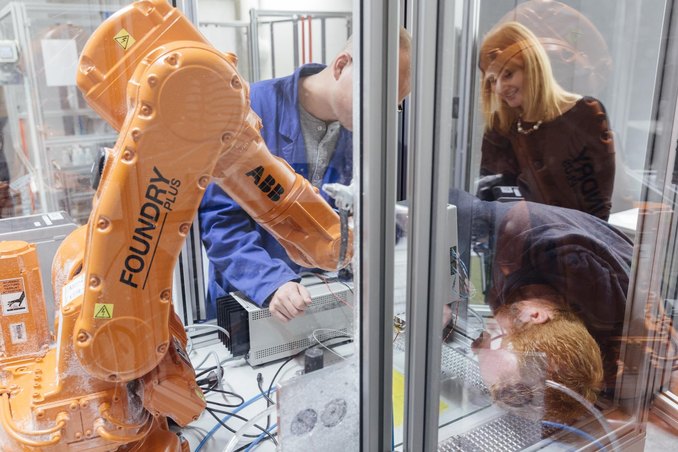New Center for Machine LearningThe Carl-Zeiss foundation promotes endowed professorships at Aalen University
With 2.7 million Euros, the Carl-Zeiss Foundation has supported the construction of a centre for machine learning at Aalen University since April 2020. Machine learning has quickly become a key technology for applications in the industry. The goal is to teach machines to be able to perform complex tasks intelligently and automatically. Through anchoring the topic in education and further training, the center should secure the need for adequately trained workers in the East Wuerttemberg region.
Starting in January, Aalen University received the funding approval in the framework of the pilot program: „United Professors at Universities for Applied Sciences“ from the Carl-Zeiss foundation. The funding will proceed by financing two full professorships and six positions for additional academic staff over a period of five years. The professors are thus active both at the university, as well as in companies. This way, they can get to know both worlds in an early career stage and connect with one another. „Many universities are focused on searching for highly qualified workers in scientific-technical areas, in order to compete with the economy, because it’s hard to find the same specialized workers there. That is why we are searching for new methods. We want to test one such idea together with Aalen University“, says Minister Theresia Bauer, chairwoman of the Carl-Zeiss foundation.
Aalen University is using the funding of the two endowed professorships as a seed for creating a center for machine learning, and its application in the industry, which have been planned for a longer period of time. Through both professors with designations in Computer Vision and Deep Learning, modern procedures for analyzing picture and video files in industrial production should be developed.
Bundling Competences and Activities
For years, Aalen University has strategically been designing activities in the areas of digitalization, Industry 4.0 and machine learning. This occurs through new degree programmes and further training offerings, or through acquiring and implementing research projects. An important building block in this context is promoting competences by means of new professors, who bring their expertise to teaching and researching. University President Professor Dr. Gerhard Schneider explains: „Efficiently working with huge amounts of data and using it intelligently holds enormous potential for the economy, science and society. We want to combine current and new activities in this field together. Several regional companies have already indicated their desperate need for this, as well as approved future support. I wish to especially thank the Carl-Zeiss Foundation, which has greatly contributed to establishing this center“.
Bringing Machine Learning into Application
Aalen University is well known for its competency in industrial application domains, such as mechanical engineering, production, simulation or material sciences. Using this knowledge for questions raised at the Centre for Machine Learning poses both a challenge and an opportunity for Professor Dr. Ricardo Büttner, who will coordinate the new center. Typical questions are, for example, predicting the quality of construction materials during production, early recognition of waiting times for machines, or securely recognizing objects in the streets for autonomous driving. „What’s fascinating about machine learning is that the established methods can quickly be introduced to various application fields like production, mobility, energy or medicine“, says Büttner.
About Aalen University
Aalen University in East Wuerttemberg belongs to the strongest research universities of applied sciences nationwide. In the middle of 2020, two new research buildings will be constructed at Aalen University, which will significantly improve the conditions for research and transfer. Central research topics are „New Materials and Production Techniques“ as well as „Photonics“. Currently, the partnership concept SmartPro (Smart materials and intelligent production technologies for efficient products of the future) is being implemented, which is funded with 5 million Euros between 2017 and 2020 by the BMBF through the programme FH-Impuls. The planned Center for Machine Learning should utilize over ten new professors and 50 scientific faculty members.
About the Carl-Zeiss Foundation
The Carl-Zeiss Foundation has set the goal of creating free spaces for scientific breakthroughs. As a partner for excellent science studies, they support both fundamental research and education in STEM areas (mathematics, computer sciences, natural sciences and technical sciences). Founded in 1889 by the physicist and mathematician Ernst Abbe, the Carl-Zeiss Foundation is one of the oldest and biggest private supporters of science studies in Germany. It is the single owner of Carl Zeiss AG and SCHOTT AG: Their projects are financed by dividend payouts of both foundation companies.

